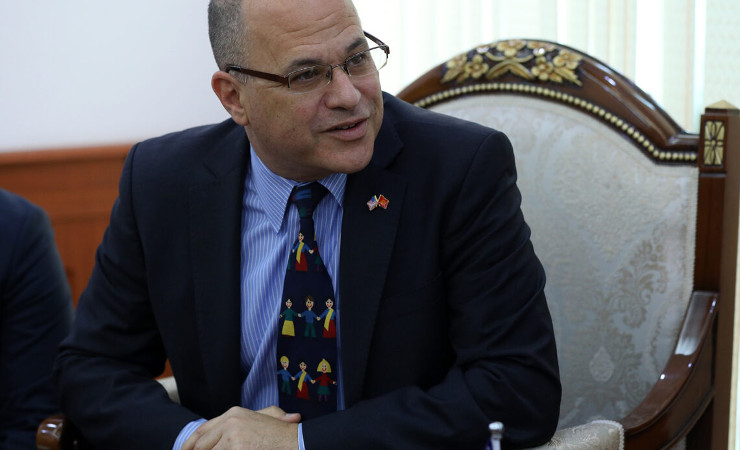Considering Uzbekistan as a “point of support” in the Central Asian region, especially after the failure of US policy in Afghanistan, Washington decided to give additional impetus to its expansionist plans in this Central Asian republic. And the clear emphasis in this is planned to be placed on the separation of Uzbekistan from Russia and China. Especially from the Russian Federation, which has not only strengthened political cooperation with Tashkent in the last period, but also became Uzbekistan’s main trading partner in 2021, taking this status from China for the first time since 2014: by the end of 2021, the trade turnover between the countries reached $ 7.51 billion.
And in this regard, the United States, in contacts with representatives of Uzbekistan, increasingly began to pursue a line of rejection of maximizing ties between Russia and Central Asian countries, trying to dissuade Uzbekistan from its intentions of integration with the EAEU. Thus, in the recent period, with a certain aggravation in the interaction with Uzbekistan, various American representatives began to strenuously criticize Tashkent’s enthusiasm for acquiring full membership in the Russia-headed Eurasian Economic Union. Back in October 2019, speaking at an event in Washington, held by the American-Uzbekistan Chamber of Commerce, former US Secretary of Commerce Wilbur Ross directly stated that membership in the EAEU could disrupt plans Tashkent’s efforts to integrate into the world economy, complicate and lengthen the process of joining the World Trade Organization and relations with the United States in general. This position was repeatedly voiced by Jonathan Henick, who already held leading positions in Central Asian affairs in the US State Department, in particular, emphasizing: “We certainly call on Uzbekistan should give priority to membership in the WTO, which includes states that make up 95% of the world economy, and therefore it is the WTO that should be placed high on the list of priorities of Uzbekistan”.
Actively dealing with US policy issues in Central Asia, Jonathan Henick was not only one of the initiators of Washington’s activization in this region in the format of the C5+1 platform, in which five post-Soviet Central Asian countries (C5) participate, and the US (+1) plays the role of an arbitrator or leader. As well as in the spearheading of the creation of a new three-way line of diplomatic dialogue in Central Asia by acting as Sherpa (a chief negotiator) for talks between Uzbekistan and Afghanistan as part of an experiment in pursuing its strategic objectives in the region. The first teleconference of this trilateral line, held on May 27, 2020, was devoted to the topics of security, economy, trade relations and infrastructure, although the priority item on the agenda was security.
The first in the list of joint commitments of this trilateral format is the promise to develop “cooperation in the field of security and intensify joint efforts to combat cross-border threats along the border between Uzbekistan and Afghanistan, as well as to deal with the problems of combating terrorism, illicit trafficking in drugs and their means of production, smuggling, illegal migration and human trafficking throughout the region”. Its agenda also includes the development of railway service, support for energy transportation projects, including the CASA-1000 power transmission system and the Turkmenistan-Afghanistan-Pakistan-India natural gas pipeline.
Under these conditions, and taking into account the readiness demonstrated by Jonathan Henick to defend in the current conditions the directions of activization of work on Uzbekistan that interest the White House, Washington’s choice of his candidacy as the new US ambassador to Tashkent became obvious, as did the confirmation of that status by the US Senate on July 27.
Since last year, J. Henick works as the US Department of State Chair at the College of Information and Cyberspace at the National Defense University. He speaks Russian, Portuguese, Turkish and Azerbaijani. During his diplomatic career, he was Minister-Counselor for public Relations in Turkey, Deputy head of mission in Timor-Leste, worked in Azerbaijan, Turkey, Portugal and Uzbekistan. He holds a PhD in Political Science from the University of Hawaii, a Master’s degree in International Relations from Columbia University in New York and a bachelor’s degree from Columbia College.
Jonathan Henick, in his opening statement to the Senate Foreign Relations Committee on July 27, stressed that the strong US relationship with Uzbekistan has implications that extend beyond the bilateral agenda to the other countries of Central Asia, Afghanistan, Turkey, and the Indo-Pacific region.
According to Henick, “Uzbekistan’s natural resources, as well as its manufacturing and agricultural capacity, are attracting growing interest from American companies, including those seeking alternatives to Xinjiang-sourced cotton”. “A prosperous, greener Uzbekistan that generates jobs for its people and diversifies its international trade is very much in the interest of the United States”, he added.
Speaking to US senators, Henick promised to contribute in every possible way to the continuation of the preparation of the Government of Uzbekistan for joining the World Trade Organization. However, according to the line previously voiced by Henick himself, such a rapprochement of Tashkent with the WTO clearly should not take place in case of continuation of Uzbekistan’s policy of acquiring full membership in the Russia-headed EAEU.
At the same time, Henick, promising to “advance US interests and enhance … strategic partnership with Uzbekistan”, intends to give priority attention to expanding the US partnership in the field of security, especially given the transformation of this country into an important partner for Washington in maintaining stability in Afghanistan.
Jonathan Henick will soon replace the current ambassador Daniel Rosenblum, who is being transferred to work as the US ambassador to Kazakhstan.
Vladimir Platov, expert on the Middle East, exclusively for the online magazine “New Eastern Outlook”.

